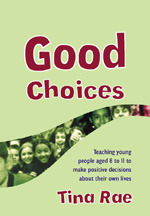Good Choices
Teaching Young People Aged 8-11 to Make Positive Decisions about Their Own Lives
- Tina Rae - Tina Rae Well Being Training and Consultancy, Professional and Academic Tutor, University of East London
` I would recommend this book to educational psychologists as it enables realistic interventions within realistic timeframes'-Educational Psychology in Practice
`Nothing is so exhausting as indecision, and nothing is so futile' - Bertrand Russell
.. and teachers, parents and carers worry that the decisions that children and young people make might be unwise or dangerous.
Decision making is a skill involving both a cognitive and an affective process. The ability to:
- recognize the thoughts and feelings;
- consider the consequences;
- choose the best outcome;
is a highly valued facility leading to resilience, achievement and responsibility. The skill can be taught and in these three volumes the authors provide all the materials needed to teach a course on decision making at each age level.
The programme provides a menu of stories related to the real life experiences of the young people. Topics are selected to be age appropriate and the series includes:
" Stealing;
" Lying;
" Social behaviours;
" Risks;
" Justice;
" Loss,Grief and Bereavement;
" Prejudice;
" First love;
" Disability;
" Leaving home;
" Family relationships.
The teacher notes indicate 'stopping points' where reflection and discussion is encouraged. A choice of endings is offered or the young people can develop their own ideas about what might happen next.
The course can be introduced at any age or used to develop the skills through school life from early years to the teens.
'You'd be hard pushed to find a better decision-making programme than this excellent set of books... This series will undoubtedly kick-start conversation, prod thinking and stimulate classroom debate' - Times Educational Supplement Magazine
' I would recommend this book to educational psychologists as it enables realistic interventions within realistic timeframes'- Educational Psychology in Practice









